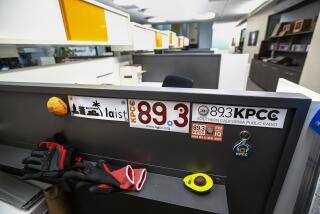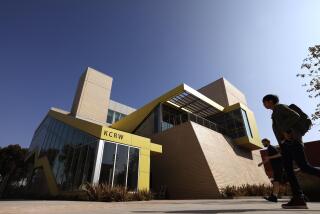KPCC listener donations lift station through crisis
NPR fans, rejoice. If there was any clear-cut victor in last week’s showdown over federal funding for public broadcasting, it’s KPCC listeners who were spared a day and a half of fund-raising appeals because of a bump in donations.
Executives at KPCC-FM (89.3), a member station of National Public Radio in Pasadena, said they called off their fund-raising early because of strong support from listeners, with some responding because of a potential loss in federal funds.
“I think the threat of cuts brought people’s attention about how important public radio is to them, and if they value the service, they realize that individuals should support it,” said Diana Bernal O’Leary, KPCC’s director of development.
But some critics lambasted stations for using radio airtime to lobby Congress. On Friday, Cliff Kincaid of the watchdog group Accuracy in Media called for an independent investigation into possible legal violations. He was not referring to a specific station but to all NPR affiliates invoking looming budget cuts.
Interviewed on “To the Point,” a talk show on KCRW-FM (89.9) in Santa Monica, Kincaid described the on-air appeals as a “use of federal funds to lobby the federal government for more federal money.”
KCRW and KPCC were among the NPR member stations nationwide that -- outside of regular news reports -- encouraged listeners to take action on a proposal in the House of Representatives that would have cut nearly half the federal funding for public broadcasting.
KPCC was, coincidentally, airing its fiscal-year-end fund drive just as the measure was being debated in Washington, and news reports were aired about Kenneth Y. Tomlinson, a top public broadcasting official who has accused PBS and NPR of a liberal bias in programming.
Listeners heard the usual pitch, with KPCC comparing the value of its programming to the monthly cost of cable and cellphones, but they were also told that the proposed cuts, if approved, would cause a loss of at least $300,000. The station receives $492,000 -- 6% of its annual budget -- from the Corporation for Public Broadcasting.
The station ended its on-air fund-raising effort at noon Thursday after reaching its goal of $450,000; $18,000 more had rolled in by Sunday afternoon, according to the KPCC website.
Bill Davis, president Southern California Public Radio, which includes KPCC, said he thought the station portrayed the issue objectively by urging listeners to show support for public radio “whether or not you agree with the notion the cuts are appropriate.”
Davis said the station heard from “conservatives, liberals and moderates who appreciated that we weren’t making this an ideological point.”
He added that KPCC did not elevate its fund-raising goal or assume the cuts would be adopted because of events in Washington. “If we were opportunistic or nefarious that could have happened,” Davis said.
NPR supporters won a reprieve Thursday when the House restored $100 million of the cuts. Though the measure still contains an overall 25% reduction in funding for public broadcasting, supporters are optimistic about prospects in the Senate.
For several days before the vote, the Santa Monica station aired 30-second spots every hour, urging listeners to write their congressional representatives about the funding cuts. General Manager Ruth Seymour said the appeals prompted a flood of calls on behalf of KCRW and public broadcasting.
Of KCRW’s budget, 9% comes from the federal government, amounting to $1 million annually, Seymour said.
“Of course we should take a stand -- we are a steward of a public resource and we not only have a right but a responsibility to inform our viewers,” she said.
While other media outlets fret about diminishing audiences, NPR stations are thriving. Audiences have approximately doubled since 1998 and are fairly upscale. The median income of an NPR listener is $89,989.
But even with a half-million listeners in one of California’s most affluent cities, KCRW still faces a challenge getting people to write checks, Seymour said.
“In a crisis, you’re always going to do well with fund-raising,” she said of KPCC’s success, “but the day-to-day [fund-raising effort] doesn’t work out that way.”


